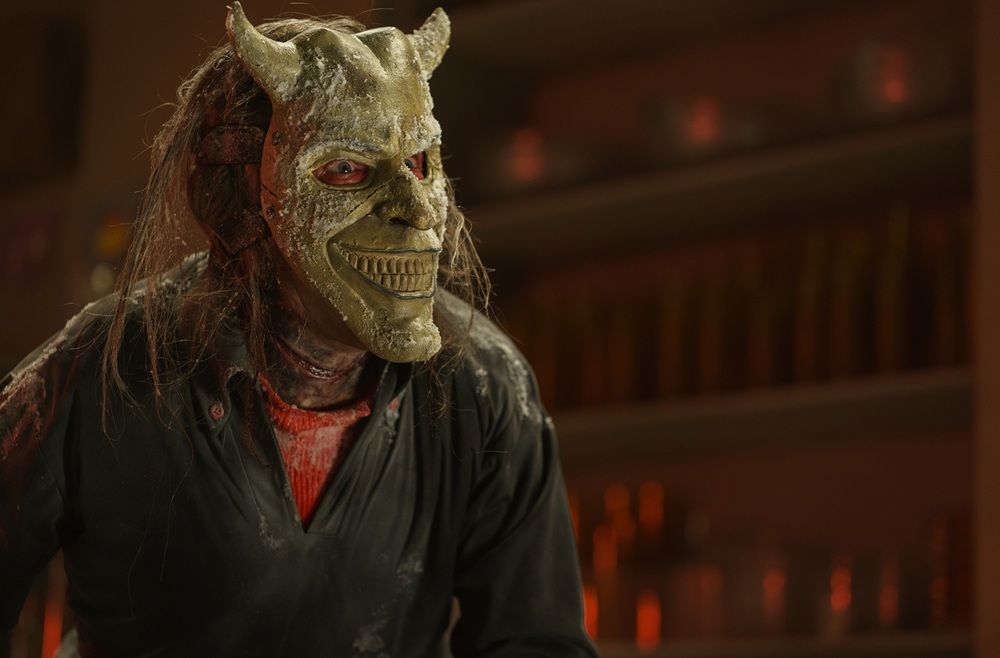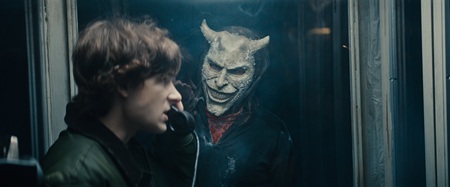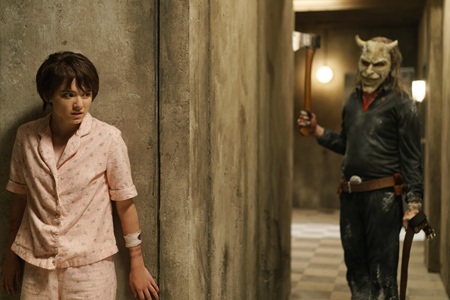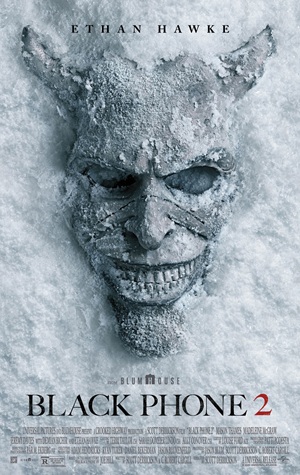
Austere Black Phone 2 is a Wintry Descent into a Psychologically Isolated Unknown
It’s been four years since Finney (Mason Thames) killed the serial killer The Grabber (Ethan Hawke), and it’s clear to his feisty sister Gwen (Madeleine McGraw) that he’s never fully recovered from the experience. Yet the pair remains inseparable, and while they don’t exactly tell one another everything anymore, when it’s important, when it matters most, each knows they can count on the other no matter what the circumstances or stakes.
When Gwen starts receiving mysterious visions of their long-dead mother Hope (Anna Lore) when she was Finney’s age, brother and sister become committed to discovering what these dreams are all about. Along with Ernesto (Miguel Mora), a friend of Gwen’s who is also the little brother of one of The Grabber’s victims, and much to the hesitation of their now-sober father, Terrence (Jeremy Davies), the teenagers journey to Alpine Lake. It’s a secluded, snow-covered Christian winter camp run by the gregarious Mando (Demián Bichir).
This is where Hope once worked as a counselor and began to develop her psychic powers. It’s also the site where The Grabber stalked, snatched, and gruesomely murdered his first three children.
If 2021’s The Black Phone was frequent collaborators Scott Derrickson and C. Robert Cargill’s take on late 1970s, supernaturally-infused grindhouse exploitation, then Black Phone 2 is their ambitious, moodily confident foray into 1980s dreamscapes and nightmares made popular by the likes of Stanley Kubrick’s The Shining and Wes Craven’s A Nightmare on Elm Street. Even if it doesn’t all quite work, this is a creepily inventive shocker that grows in mournful power as it moves along. It also features a compelling, achingly sympathetic performance from McGraw that I found sensational.
Expanding considerably away from author Joe Hill’s source material (who does return as an executive producer), Derrickson and Cargill flip-flop the focus this time around. Where the first story centered mainly on Finney and his encounters with The Grabber (along with the ghosts of the children he’d previously murdered), this time Gwen takes center stage. She’s the one who has to find out what happened to the kids at Alpine Lake back in the late 1950s. She’s also the one whom The Grabber, now an ethereal spirit who can attack his victims through seemingly sheer force of will, sets his vengeance-filled sights upon, knowing that her death will cause Finney the maximum amount of grief.
It’s a great way to shake things up. But just because the filmmakers put Gwen first this time, that does not mean they shortchange either of their primary protagonists. This brother-sister duo remains at their strongest when they work together, and it is their familial bond that makes them such a formidable threat to The Grabber and his blossoming paranormal power. Thames and McGraw have authentic chemistry; their continual give-and-takes as they trade barbs, offer words of encouragement, and openly pronounce their sibling love for one another are simply outstanding
The first half that sets up the stakes for Finney, Gwen, and everyone else trapped at Alpine Lake (an impenetrable blizzard shuts down the camp and makes escape impossible) works better than the second. When The Grabber goes full-blown Freddy Krueger and starts tossing around a sleepwalking character as if they were a frisbee also struck me as far more silly than scary. Additionally, it’s semi-difficult ascertaining what the rules are (if there are any) as it pertains to this villain’s new, otherworldly powers. At times The Grabber appears to be all-powerful on an almost unbeatable scale. At others, they seem trapped, only able to engage with the real world when Gwen is dreaming.
No matter. Derrickson stages several dynamic set pieces, and his utilization of this isolated wintry landscape is stunning. Editor Louise Ford (Nosferatu) manufactures a lyrically haunting vitality that, even though the sequel is measuredly paced, adds a tensely disquieting aura that considerably amplifies the inherent suspense at the heart of the material with affecting bravado. Production designer Patti Podesta (Dark Harvest) also does incredible work, and Alpine Lake is a magnificently realized playground for all of this bloody carnage to take place within.
Hawke is as wickedly nasty as ever as The Grabber, and while I do think this demon does tread a little too closely to the homophobic Gay-men-as-child-predator stereotype, the talented actor still gives him a quirkily terrifying gravitas that’s fascinatingly unique. Thames also continues to grow as an actor. I loved the slight physical hesitations and subtle facial inflections that happen each time Finney ponders answering a phone with cries for otherworldly help he knows he’s currently incapable of assisting with. These moments, while few, speak volumes, and they are a key insight into who this character is now and how their prior ordeals are still twisting their guts into knots.
But it’s McGraw who dominates. Her performance is a rollicking, uninhibited celebration of passion, intensity, and empathetic resolve. Gwen’s verbal vulgarity conceals an inner turmoil that she’s worried will lead her down a similarly self-destructive path as the one she believes her mother tragically went down. Now faced with The Grabber in ways her brother never had to experience, the youngster must learn to accept her powers and no longer fear them, and McGraw makes this psychological battle physically concrete with gritty ferocity.
I’ll be curious to see how audiences react to this sequel. Instead of taking the easy way out and offering up a scenario that’s nothing other than more of what made the first film so popular, Derrickson and Cargill fearlessly take things to an even more internally bleak destination. Black Phone 2 calls viewers to attention with rigidly frigid authority, and it is only through togetherness, compassion, courage, and communal fortitude that individual humanity is discovered, forgiveness granted, and hope for a better tomorrow restored.
– Review reprinted courtesy of the SGN in Seattle
Film Rating: 3 (out of 4)








